nlopchantamang.com
The Early Bird Monetizes the Worm
Aja Frost @ajavuu
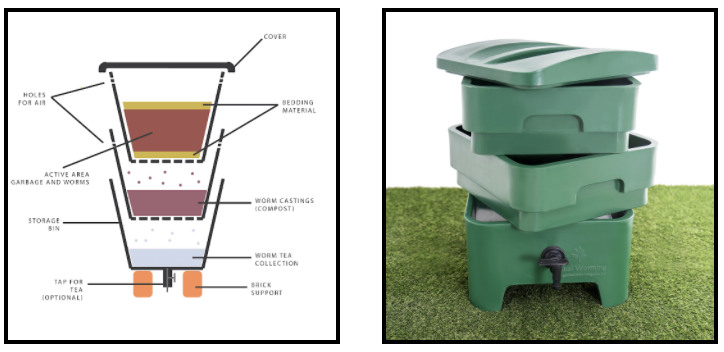
The Signal: Vermiculture is worming its way into the hearts of Americans. There has been a recent spike in search interest for “worm farms” in the US, matching countries like Australia, New Zealand, and South Africa where at-home worm farms have been popular for many years.
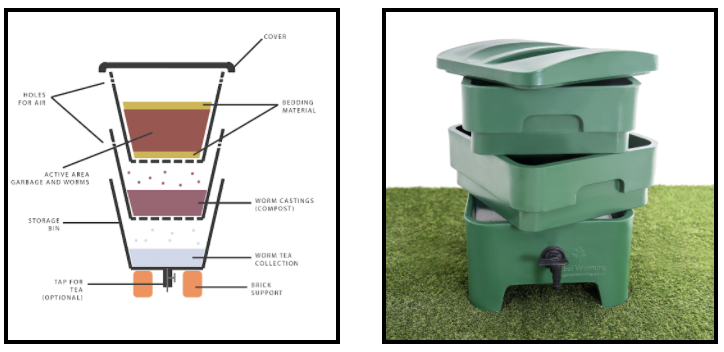
Worm farms are used to recycle food scraps and other organic waste into natural fertilizer products. Worm farming, or vermicomposting, involves feeding organic waste to worms that thrive in decomposing matter. The worm castings are harvested as garden manure, from which liquid fertilizer can also be harvested. The primary benefit of worm farming is that it is environmentally friendly: Waste that would normally end up in a landfill is converted into rich organic compost for the garden.
Vermiculture is not the only DIY gardening craze that has been trending since the pandemic: Pinterest searches for “indoor beekeeping” and “how to grow spinach from scraps" are up 4,087% and 1,043%, respectively, in recent months.
The Opportunity: Being confined to our homes and small apartments has clearly given us a newfound appreciation for nature and the great outdoors. Search interest in vermiculture-related terms according to Keywords Everywhere proves that there are opportunities to capitalize on the worm farming craze:
- Worm farm: 27.1k searches/month
- Worm composting: 14.8k searches/month
- Vermiculture: 12.1k searches/month
- Wormery: 8.1k searches/month
- Worm farm kits: 2.4k searches/month
- Composting worms for sale: 1.6k searches/month
- Worm farm for kids: 1k searches/month
Search interest on Amazon for worm farm products (which include boxes, worms, and “how to” guides) has also wriggled upwards by more than 100% over the last 30 days, according to JungleScout. The Squirm Firm brings in ~$215k per month on their composting bins and worm farm kits. This figure doesn’t include sales from their website, which had ~14k visits in April entirely from organic search, a 103% increase from March, according to SimilarWeb.
After you’ve bought the bins and starter worms, the cost of maintaining a worm farm varies. In many cases, there are no maintenance costs -- you just feed the worms kitchen scraps and use newspaper or leaves for bedding. But some people give their worms the Rolls Royce treatment by using volcanic ash or oyster shell powder as a digestive, or coconut coir for bedding (~$10/lb). Every worm farm needs a starter pack of worms, and may even need occasional top-ups. Worm suppliers on Amazon are cashing in. Uncle Jim’s Worm Farm, for example, makes ~$360k per month on composting worms. (Yes, you read that right: $360,000!)
The Squirm Firm, Uncle Jim, and othear suppliers on Amazon have had to limit their product selection over the past few weeks due to unprecedented demand, suggesting that there’s room for new entrants to close the gap by providing worm farms and associated paraphernalia such as moisture and pH meters, rakes, bedding, worm blankets, and probiotic digesters.
Educational Tools and Communities: Digging around in growing vermiculture communities on Facebook (38k members) and Reddit (10k subscribers) yields interesting results.
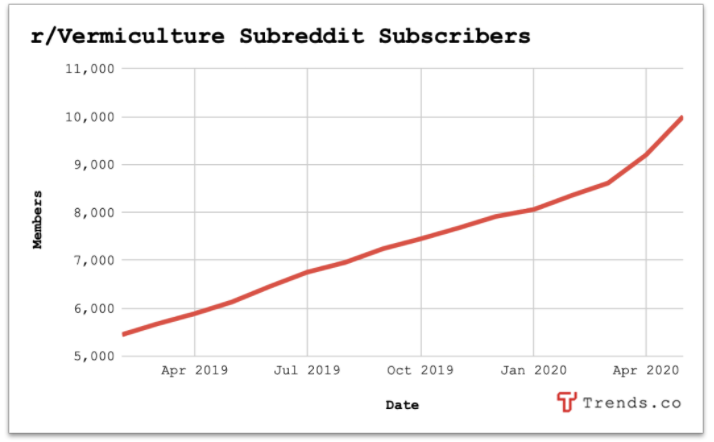
Vermicomposting groups are active, with common questions like “how many worms should I start with?”, “can the worms eat [insert food]?”, and “what materials can I use for bedding?” YouTube “how-to start” videos such as this one have more than 500k views.
As more newbies enter the space, there is clearly demand for educational tools and instructional content. E-books, online courses, instructional videos, and manuals are a few solutions. However, there are no apps in this space other than this game, which is like Farmville for worm farming.
The term “what do worms eat” has more than 18k monthly searches, according to Keywords Everywhere. Why not create an app or platform that answers the “can the worms eat [insert food]?” question, similar to this stop-light-inspired list of foods for the keto diet, which are categorized as follows:
- The Green List – Eat to Hunger
- The Orange List – Exercise Self-Control
- The Light Red List – Hardly Ever
- The Red List – Never Ever
Other Gardening Opportunities: Vermicomposting is not the only gardening trend that has been gaining popularity during the pandemic:
- Search interest in “container garden” and “window garden” has exploded in the past few weeks as people around the world face uncertainty in the food supply, which we wrote about in this article.
- The granddaddy of seed exchange platforms, Seed Savers, is temporarily not accepting new orders due to an unprecedented surge in demand. The website, which had more than 245k views last month according to SimilarWeb (a 73% increase from previous months), sells seeds and provides an exchange platform for people to swap their rare seeds. Now may be the time to create a location-specific seed-swapping app, community, or platform that connects gardening enthusiasts who can no longer attend meetups (such as these groups on Meetup.com with more than 5k members).
- There has been an uptick in search interest for the terms “insect hotel” and “insect house.” They both have 6.6k monthly searches, according to Keywords Everywhere. People are building and buying structures, ranging from shoebox- to shelf-sized, for their gardens to attract beneficial insects. One US supplier on Amazon, Niteangel, is making ~$60k per month on their bug homes and hotels, according to JungleScout.
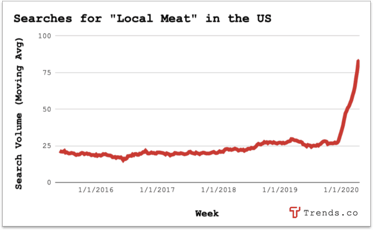
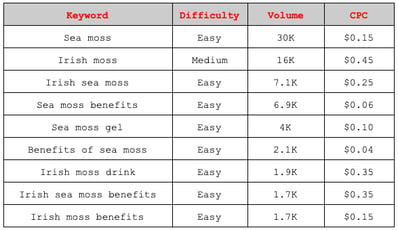
Leave a Comment